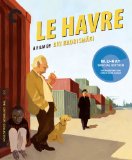| Reviews & Columns |
|
Reviews DVD TV on DVD Blu-ray 4K UHD International DVDs In Theaters Reviews by Studio Video Games Features Collector Series DVDs Easter Egg Database Interviews DVD Talk Radio Feature Articles Columns Anime Talk DVD Savant Horror DVDs The M.O.D. Squad Art House HD Talk Silent DVD
|
DVD Talk Forum |
|
|
| Resources |
|
DVD Price Search Customer Service #'s RCE Info Links |
|
Columns
|
|
|
Le Havre: The Criterion Collection
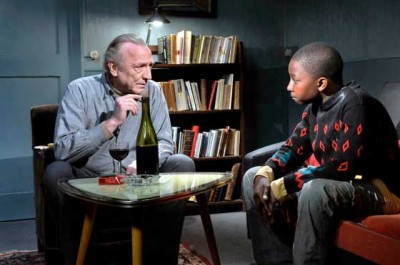
Please Note: The images used here are taken from promotional materials provided by Janus Films, not the Blu-ray edition under review.
How might one go about transforming the rundown, low-rent districts, shipyards, and other workaday views in a non-tourist-attraction French port city into a visually lovely, sweet setting for a storybook-like political-fable film -- all without veering into total escapist fantasy, doing a whole lavish Amélie on it by digitally shining it up and subtracting such pesky eyesores as cracks in the walls and the homeless? I couldn't tell you how he did it, but that is just what Finnish filmmaker Aki Kaurismäki (The Match Factory Girl, The Man Without a Past) and his team have somehow achieved in his latest offering (and first film made in France), Le Havre, which recounts the trials of an aging working-class schlub in the titular French harbor town who joins forces with his also hardworking, generous, slightly eccentric and careworn neighbors to save an immigrant boy, waylaid on his way to London, from the hard-nosed authorities. At his best, Kaurismäki tells fairly accessible dark-comic stories about ordinary people that, while he never dumbs it down, any ordinary person could understand (part of his work's charm and integrity is that he certainly doesn't think ordinary people need things dumbed down for them). But, strangely and disappointingly, never during his now almost 30-year career has Kaurismäki managed to make a relatively huge international name for himself like some other contemporary usually-subtitled auteurs (Michael Haneke, Wong Kar-Wai, even Apichatpong Weerasathakul) whose films are significantly more difficult, more "foreign" (i.e., more markedly distinct from Hollywood/narrative films) than his; I would submit that Kaurismäki's films are more populist, if steeply less popular, than even Pedro Almodovar's. The only reason I can think of is that there's something about Kaurismaki's extremely deadpan way of depicting his usually hardscrabble characters, most often in more or less dismal circumstances that then proceed to get worse, that puts people off, despite the elegant simplicity of his narratives and his clear identification with and real affection for his shambling, not at all obviously heroic working-class heroes. (Not for nothing is his most famous, and best, group of films known as The Proletariat Trilogy, and the hero of Le Havre given the surname of Marx.) With Le Havre, however, he has found a way to a golden mean that, in a better world, would be his breakthrough, crossover, whatever you want to call it -- the one among his films that your kids and your grandma would enjoy and be touched just as much as you are. But it's the kind of change an artist can make that really represents growth, not retreat -- a perhaps easier-to-take kind of struggling-people fairy tale that sacrifices nothing of Kaurismäki's decidedly eccentric sensibility while taking one small, graceful step sideways from fatalism and toward the possibility of a miraculously happy ending.
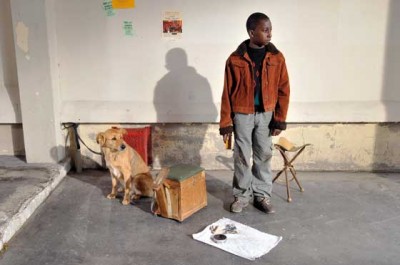
Marcel Marx (André Wilms, Europa, Europa, Kaurismäki's 1992 film, La Vie de bohème) and his wife, Arletty (Kaurismäki veteran Kati Outinen, The Match Factory Girl), a late-middle-aged couple deeply devoted to one another, if not exactly founts of emotional expressiveness, seem pleasantly stuck in their economically pinched, taciturn, contented-despite-it-all routine. Marcel is a shoeshine who's always getting hassled by better-dressed people from inside the shops as he practices his trade on the sidewalks of Le Havre. Marcel is inherently fair and kind, but life lessons have taught him to be an ultra-pragmatic realist; his first thought, in the film's hilarious opening moment as we hear a bit of criminal violence taking place offscreen (to Marcel's impassive facial response), is to make himself scarce, since he knows with certainty that "They'll find a way to blame this on me." His hard work has put a nice little pile of euros in the biscuit tin that housewife Arletty has stashed in a drawer at home, and she dispenses enough of his earnings back to him to send him off regularly to their neighborhood pub for his habitual drink and commiseration with the friendly ne'er-do-wells and the barmaid. It's a not-ignoble kind of contentment Marcel has, but fate has a one-two punch in store for him, two clouds on his perpetually and predictably gray horizon.
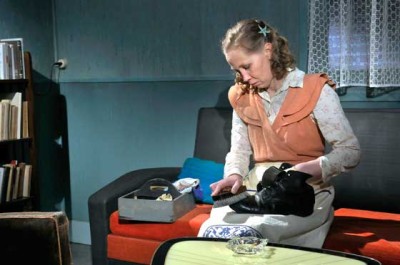
The first of these is Idrissa (Blondin Miguel), a boy of about 11 or 12, an African immigrant, and one of the "living dead" that Le Havre's shipyard workers apparently routinely find in the freight containers as the huddled refugees try to make their way to a less endangered, more prosperous life in London or points beyond. When his group is caught by the local authorities, Idrissa's grandfather encourages him to make a run for it; as he flees from the town's strict, apparently unfeeling, punctiliously letter-of-the-law-abiding police inspector, Monet (Jean-Pierre Darroussin, The Well Digger's Daughter), his path crosses with Marcel's, and the latter's natural impulse (along with that of his neighbors -- the aforementioned barmaid, the grocer (François Monnié), the baker Yvette (Evelyne Didi), and an unwillingly retired celebrity rocker called Little Bob (Roberto Piazza) who happens to live in the neighborhood) is to offer the boy whatever aid he can, regardless of how complicated such an endeavor might make his life; it is Marcel and his friends, the salt of the earth, who make the otherwise cold Le Havre live up to its name, which translates literally as "harbor" and figuratively as "refuge." Unbeknownst to Marcel, his life actually needs no further complications: The second brewing storm threatening his tough but contented life's equilibrium comes in the form of the stoical Arletty reaching the end of her rope with a painful stomach condition that has turned out to be deadly serious, and as Marcel attempts to hide Idrissa from Monet and figure out how best to help him, she is laid up at Le Havre's Flaubert Hospital, conspiring with the kindly Dr. Becker (Pierre Étaix, a filmmaker in his own right who also appeared in Bresson's Pickpocket) to hide her terminal prognosis in a misguided but instinctive effort to protect her husband from any and all pain. As Arletty languishes, Marcel works with his neighbors to put on a "trendy charity concert" featuring the return of Little Bob in order to raise the 3,000 euros required to pay off someone who can smuggle Idrissa to England, hoping all the while that they can evade the tightening net of Police Chief Monet. The odds are surely stacked against Marcel, Arletty, and Idrissa to a despair-inducing degree, but something sly yet genuine in the film's tone leaves some unsentimental, tight, but still possibly sufficient space in which hope for miracles might be able to survive. . . .
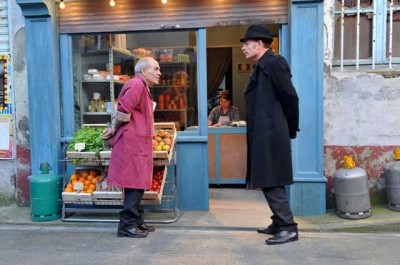
Employing some markedly skilled, sensitive artisans -- his brilliant, perfectly kindred-spirited longtime cinematographer Timo Salminen; production designer Wouter Zoon (Swimming Pool) with his boldly shaped/patterned, almost-but-not-quite-primary-colored sets; and costumier Frédéric Cambier, who outfits every character with a delightfully anachronistic simplicity (Monet's black hat and trenchcoat are pure old-movie police chief, and they're perfect, as is Arletty's canary-yellow dress) -- Kaurismäki combines the usual hallmarks of his sensibility and style (the rundown yet resilient people and surroundings; the narrative economy and succinctness, with the extraordinarily eventful film running only 90 minutes; the static and/or shuffling, never running or harried, movements of all his characters, save for the atypical Idrissa; his specific instinct for framing and mise-en-scène that results in a precise, visually appealing and striking, comic-strip deadpan in the film's look to match the immobile, ever-unsmiling visages of every character) combine here with something new, most likely in celebratory acknowledgment that Le Havre is his first non-Finnish film: an at least half-nostalgic francophilia the director wears on his sleeve (and that no contemporary French director would get away with in a million years; we're talking baguettes and accordions, but, shockingly, it works without a hitch in this context). That rose-colored love for cultural Frenchness is mostly cinematic, however; Kaurismäki doesn't lean on our knowing all the myriad references he's made to an era of politically engaged, populist, yet often poetic French cinema, the '30s and '40s of Renoir, Carné (Children of Paradise), Julien Duvivier (Pépé le Moko), and Jean Vigo, but it adds an extra dash of charm to the proceedings, a fun guessing game for cinephiles (that, however, doesn't detract from the film in the least if you're not one): Marx is an easy one (could even be Groucho, though most likely Karl), but Marcel in this context must mean Marcel Carné, as the wife, Arletty, is named after the French starlet of many Carné films (and other unmissables like Sacha Guitry's Désiré), and following from that, it's no stretch to guess that Dr. Becker is named after Casque d'or director Jacques Becker, and so on. There's even a nod of sorts to the French New Wave in the shape of a virtually cameo appearance by Jean-Pierre Léaud (yes, Truffaut's perennial Antoine Doinel from The 400 Blows on, and star of what seems like dozens of important French films over the past 50 years) as a cartoonishly mean, nasty, pathetic informant.
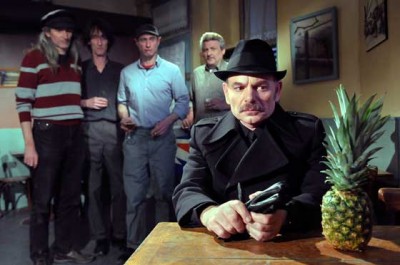
As for Kaurismäki's deeper, more significant drawing upon French poetic realism when it comes to the very tone, loose but forward-directed structure and pacing, and too-simple-to-be-quite-real story of Le Havre, as well as the Italian Neorealism of, especially, Vittorio de Sica (so many elements of the situation, from the undemonstrative generosity and selflessness of the struggling characters that melt your heart into a sticky pool, to Marcel's vocation, right down to Marcel's dog, Laika, could be straight out of Umberto D.), you needn't have seen any of those films to wholly "get" this one; Kaurismäki isn't quoting anything, he's living and breathing a tradition, and he has enough faith in what he's doing and confident ability to pull it off that the merits and qualities you can see in Le Jour se lève or Bicycle Thieves become Le Havre's own. If you do happen to have seen Le Havre's predecessors, you realize while watching it that these unusually direct, simple, humane, simultaneously tough and beautiful, tender and mordantly humorous modes have been vital components of Kaurismäki's DNA all along, and he easily has the skill to make not just a pastiche of those great classics, but a fresh, inspired, living re-embodiment, a true update, of their narrative and aesthetic values. As an experiment conducted in the name of discovering whether some of these particularly beautiful, intelligent, passionate, politically unabashed and populist cinematic styles of the past are really so timeless that they can be brought to bear on a contemporary story without missing a beat in their power to entertain, amuse, move, and provoke reflection, Le Havre is a stirring, resounding success.
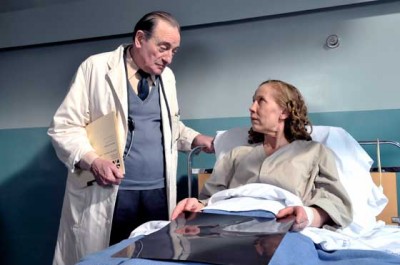
THE BLU-RAY DISC:
The AVC/MPEG4, 1080p transfer, presenting the film at its original theatrical aspect ratio of 1.85:1, is exemplary of what can be done, given the proper tools and aesthetic attentiveness, to replicate that cinematic on a digital transfer. There's not the tiniest flaw anywhere; the film's all-important colors pop magnificently, all blacks are rock-solid, skin tones are natural-looking, and there is an impressive amount of celluloid texture that has carefully been left in place during the transfer process. If only all transfers to disc could be done with this much care, we wouldn't ever have to worry that we were getting anything less than the most perfect home replication possible of the film as it was meant to look.
Sound:The DTS-HD Master Audio 5.1 surround soundtrack is rich, deep, and warm, with sonorous dialogue and all the sonic highs, lows, and in-betweens (music, dialogue, the film's carefully made ambient sound) well-integrated for an immersive aural experience, with no distortion or imbalance whatsoever.
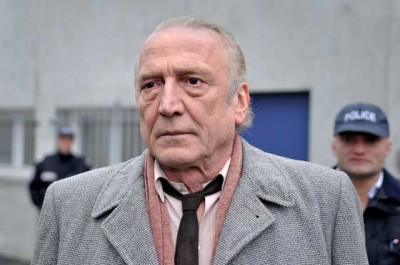
--"Le Havre at Cannes," (approx. 1 hour) features Kaurismäki, cast, and crew giving a very amusingly chaotic press conference at the 2011 Cannes Film Festival. The director, not too surprisingly, is a character, brandishing an electronic (and then a forbidden real) cigarette and giving answers more clever, teasing, and self-deprecating than straight; all in all, a much more pleasant kind of contrarianism than Lars von Trier's Hitler morass at the Melancholia press conference at the same festival. This is followed by a smaller-scale interview with just Kaurismäki and the principal actors by two reporters from what looks like a French "Entertainment Tonight," who provide such a contrast to Kaurismäki's faux-cranky terseness, he seems like a character out of one of his films.
--A 13-minute interview with star André Wilms, in which the French actor talks about his long acquaintanceship with Kaurismäki and some of the quirks of working with him, focusing in particular on tales from the preproduction and shooting of Le Havre.
--A 45-minute interview with actress Kati Outinen, practically a member of Kaurismäki's stock troupe of actors, is a revelation: She's so familiar from his films as a nearly averbal, unsmiling working-class heroine (not least in Le Havre) that it's disorienting at first to see her here as a youthful, relaxed energetic, and articulate professionally trained actress (and, I learned for the first time, professor) chatting pleasantly and informatively in response to the interviewer's well-considered, intelligent questions (this session was conducted for what looks to be a Finnish equivalent to a PBS-style, more serious and in-depth arts program).
--The uncut "Little Bob" performance footage from the film's benefit-concert sequence.
--The film's theatrical trailer.
--The beautifully designed (as usual for Criterion) booklet contains an essay on the film by critic Michael Sicinski, a longer version of a 2011 interview by Peter von Baghe with Kaurismäki from Film Comment, as well as additional illustrations by poster designer Manuele Fior.
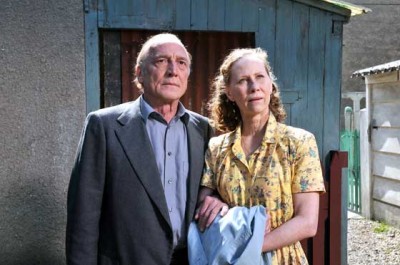
Aki Kaurismäki's Le Havre is undoubtedly the most optimistic dramatic film of the always-acclaimed, still under-recognized Finnish director's career (excluding his Leningrad Cowboys shenanigans), but that doesn't mean it lacks for the at once deadpan and endearing performances, particular lower-working-class milieu, or only slightly self-conscious, stark, subtly geometrical visual style that his wonderful films are known for. And if it seems strange that he would take as the occasion for his unusual optimism the contentious political issue of immigration law and enforcement in France -- a country I love but one not many would call an open-armed haven for immigrants, even when they're citizens from its own former colonies (see Michael Haneke's Caché) -- it's a concept that the director has realized with loving care, his eyes on the silver screen of the past (running films like Bicycle Thieves, Umberto D, and Children of Paradise, and maybe one or two of the more brightly-colored, forthrightly melodramatic Fassbinders) and his tongue hovering somewhere just on the verge of his cheek. It's a creative, paradoxically fine-tuned amalgam of all its broad cinematic influences, telling its simple story of an illegal African immigrant child sought by the authorities; the aging, poor shoeshine that helps him; and the shoeshine's ailing wife in a way that makes for an honest and heartfelt tribute to the old classic films it has on its mind without such heavy quotes around the references that it stifles any of the genuine joy Kaurismäki and his players clearly derive from telling their tale. Like its Neorealist forebears, it's one of those magical movies that manages to be at once entirely accessible, socially/politically relevant, and aesthetically transporting, often achieving an affectionate, populist visual poetry that verges on comic-book-like graphic design. The absolute must-see Kaurismäki remains his Proletariat Trilogy, but Le Havre isn't far behind as an important entry in his unique oeuvre; it's a feather in the cap for a major filmmaker (in a perfect world, he'd be known as the Finnish answer, though strictly behind the camera, to Charlie Chaplin) who has once again delivered a simple, fable-like story infused with his inimitable brand of poker-faced tenderness toward his heroically struggling, deadpan characters. Highly Recommended to everyone, from the finickiest cinephiles to even the most subtitle-averse seekers of pure, simple, excellent entertainment.
|
| Popular Reviews |
| Sponsored Links |
|
|
| Sponsored Links |
|
|
| Release List | Reviews | Shop | Newsletter | Forum | DVD Giveaways | Blu-Ray | Advertise |
|
Copyright 2024 DVDTalk.com All Rights Reserved. Legal Info, Privacy Policy, Terms of Use,
Manage Preferences,
Your Privacy Choices | |||||||









